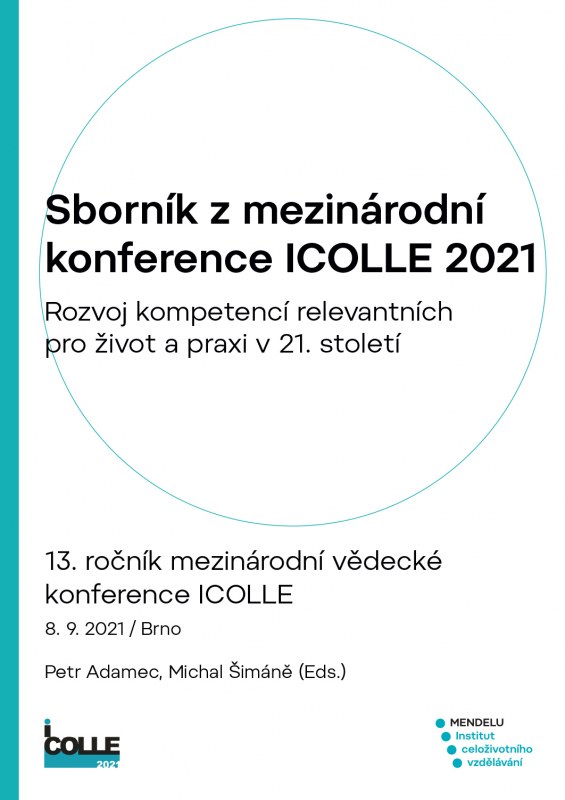
DOI: 10.11118/978-80-7509-832-0-0105
KVALITA VÝUKY A PŘÍNOS VYBRANÝCH VŠEOBECNĚ VZDĚLÁVACÍCH PŘEDMĚTŮ NA TECHNICKÉ UNIVERZITĚ
- Jaroslav Lindr
Teachers and experts call for the general development of students and for necessary acquisition of all the key competencies of graduate. For research purposes in order to determine the benefits of teaching for students, the social science subject Presentation Skills and the subject Mathematics at technical university thought in 2018–2020 were selected. The purpose of these subjects lies in fulfilling theideal of comprehensive development of students as it is declared in the graduate profile. In order to find the 8–12 most important criteria for the quality of teaching, the results of two statistical methods are presented: the principle component analysis and the forward step method. Criteria such as the need for personal development, intellectual stimulation, the influence of the teacher’s personality and the overall impression of teaching, all play a crucial role in the contribution. In order for the subject to have the required level, it is necessary to evaluate whether it meets the criteria of quality teaching. Furthermore, in the social science subject, students also expect meaningfulness, inspiration and usefulness of the subject. If students do not receive these values, they do not enjoy learning, they do not perceive it as a pleasant, and they feel that it is not needed. The students appreciate the fact that they can express their opinion. For a science subject, a more positive appreciation of the importance of mathematics for technical studies can be expected. However, it turns out that students would appreciate more if the teaching of mathematics was inspiring, interesting, needed for future work and could help students. Negative correlations are exacerbated by the fact that students do not enjoy leaching, they are not pleased with it, do not like mathematical related subjects, it is a burden to them and have to study a lot. However, in general terms the students perceive the teaching to be of overall good quality.
Keywords: social science courses, science courses, general development, benefit, quality education criteria, statistical proceedings, principal component analysis, step method forward
pages: 105-115, online: 2022
References
- Adamec, P. (2018). Teorie a praxe řízení kvality v celoživotním vzdělávání na veřejné vysoké škole. Lifelong learning - celoživotní vzdělávání. 8(2), 49-73. ISSN 1804-526X. Dostupné z: https://lifelonglearning.mendelu.cz/8/2/0049/
 Go to original source...
Go to original source... - Helmke, A. (2008). Qualität im Unterricht der Sekundarstufe. Dostupné z: http://www.heuber.de/sixcms/media.php/36/sympl_4_qualitaet.pdf
- Light, G. & R. Cox (2001). Learning and Teaching in Higher Education: The Reflective Professional. London: Paul Chapman Publishing.
- Maňák, J. (2009). Vzdělávání ve společnosti vědění. In: T. Janík, et al. (ed.), K perspektivám školního vzdělávání (s. 11-20). Brno: Paido.
- Maňák, J. & V. Švec (2003). Výukové metody. Brno: Paido.
- Meyer, H. (2004). Was ist guter Unterricht? Berlin: Cornelsen Verlag Scriptor GmbH.
- Pasch, M., et al. (1998). Od vzdělávacího programu k vyučovací hodině. Praha: Portál.
- Pol, M. (2009). Škola v proměnách. Brno: MU.
- Pöschl, R. (2011). Postoje žáků ke škole. Praha: NUOV. Dostupné z: http://www.nuov.cz/uploads/AE/evaluacni_nastroje/25_Postoje_zaku_ke_skole.pdf
- Ramsden, P. (1991). Learning to Teach and Higher Education. London: Routlage.
- Slavík, J., et al. (2017). Transdisciplinární didaktika. Brno: MU.
- Vašutová, J. (2002). Strategie výuky ve vysokoškolském vzdělávání. Praha: PaedF UK.


